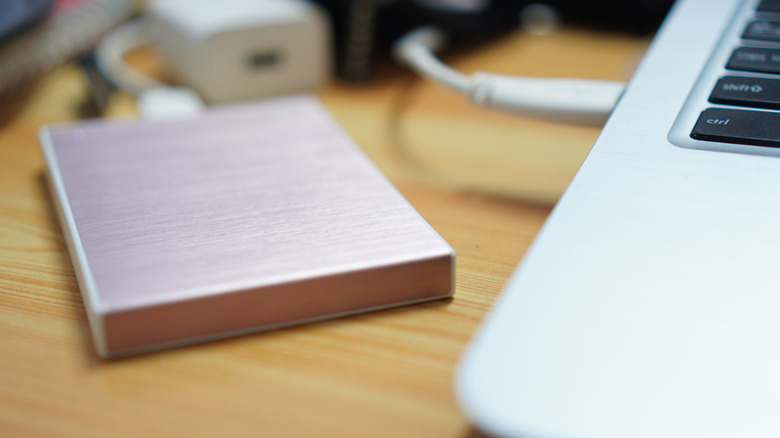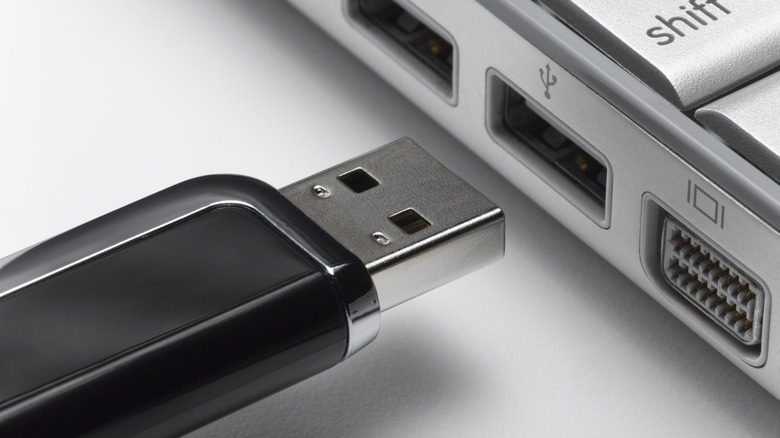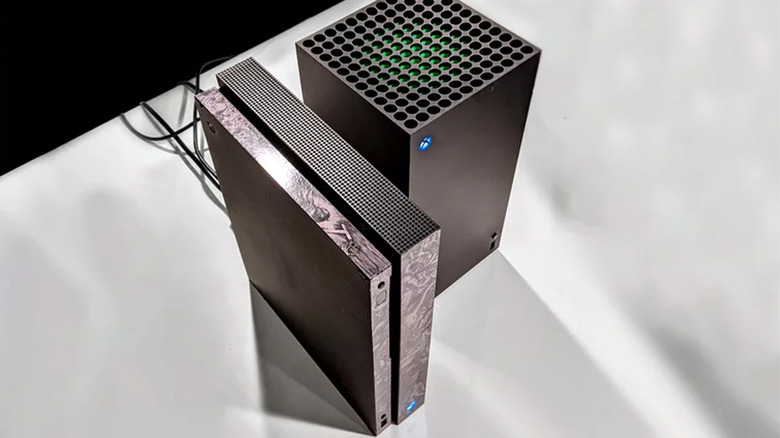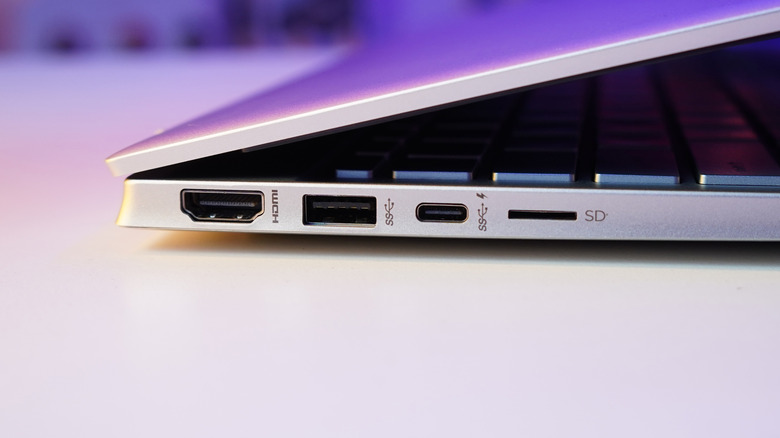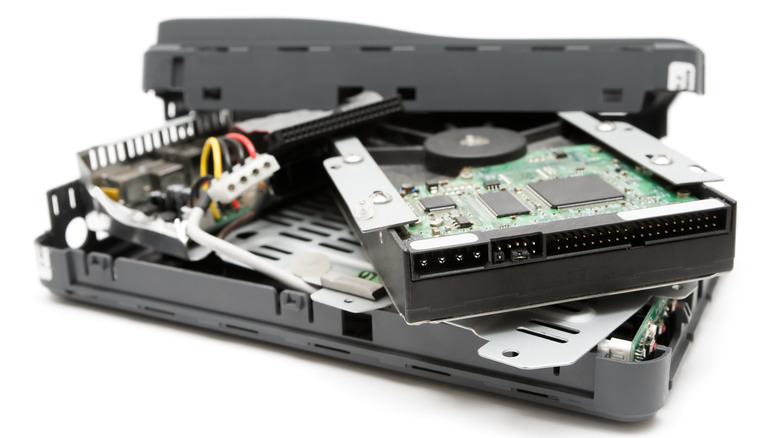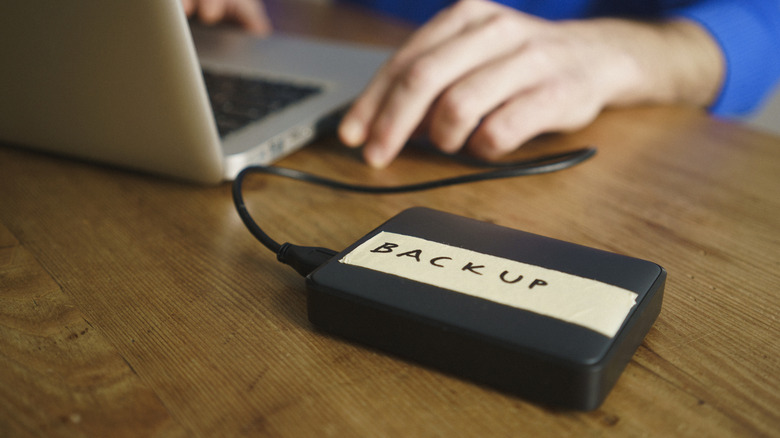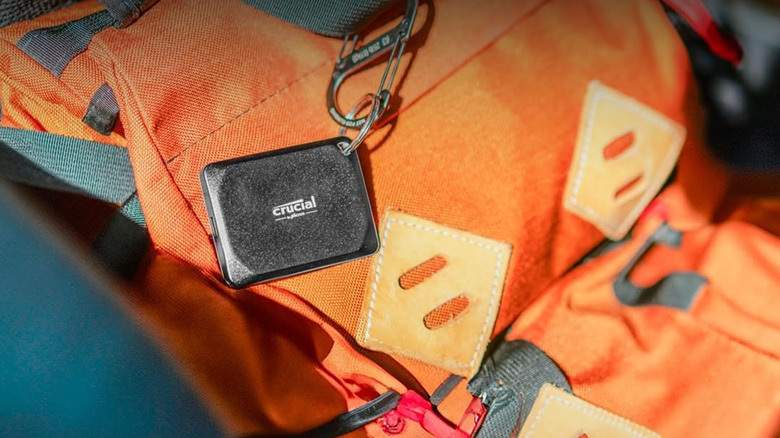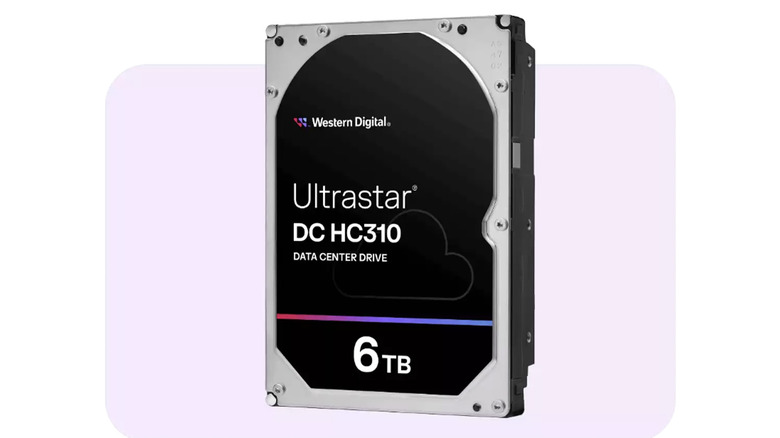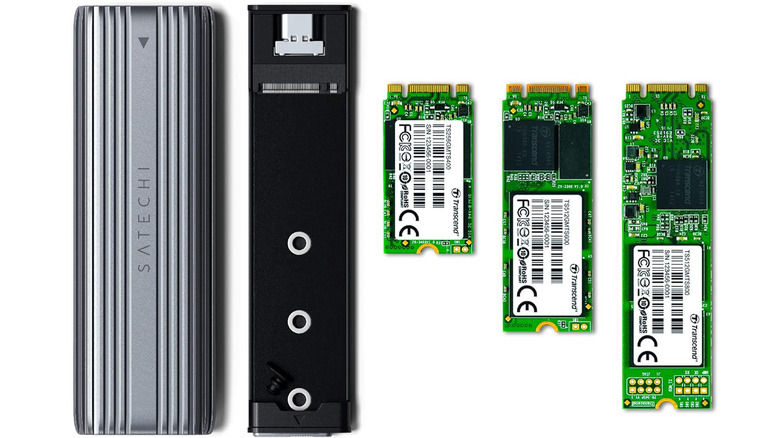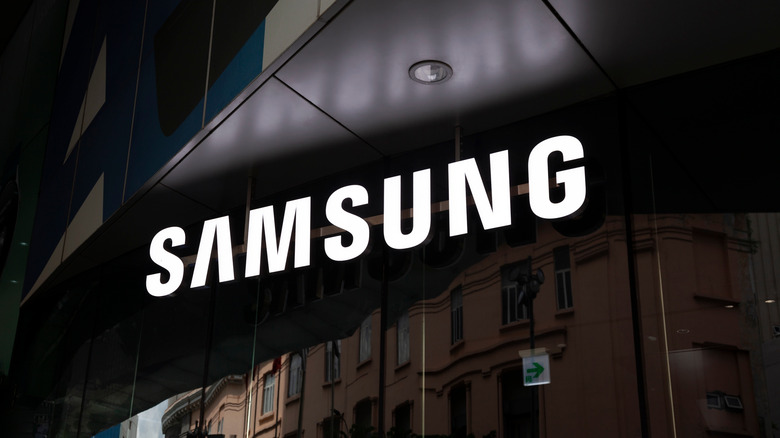10 Things You Should Know Before Buying An External Hard Drive (New Or Used)
We may receive a commission on purchases made from links.
Buying an external hard drive is one of the best decisions a PC or Mac user can make. It gives you the option of backing up your data in a form factor that detaches from the machine, allowing you to keep your data safe in a different location. Millions have lost all of their photos, music, videos, and important documents because their computer's hard drive fried or because they lost their device entirely. So, if you're wondering if having a backup drive is a smart idea, then you'll be happy to know that it absolutely is.
However, like any product category, there are some things people should know before buying an external hard drive and some situations where one type of external hard drive is better than another. For example, what you'll use your external drive for will help determine what kind you want. Some folks have tons of photos and videos that they want to back up, so cost and storage matters the most. Others may want to load an entire operating system on their hard drive and carry it around, which works best with a different kind of drive.
Even the nomenclature can be confusing for first timers. For example, many people still refer to all storage drives as hard drives, even though hard drives refer to a specific kind of drive. We'll go over the various things you should know before buying a storage drive so that you can go into your purchase as educated as possible.
Get the correct type of storage
There are three main types of external storage. The first are mechanical drives, which are old school HDDs. These have been around for decades and have improved immensely over the years. Despite their advanced age, there are benefits to having an HDD. The price per GB is the best of any type of storage and you can easily find 4 TB external hard drives for under $100 when sales are going on. HDDs are best for bulk storage, backups, and similar applications.
Over the last couple of decades, solid state drives, also known as SSDs, have become more common. Typically, you'll find them as storage drives in more expensive laptops, desktop PCs, and even modern game systems like the PlayStation 5 Pro. However, you can also buy them as external hard drives. Like their internal counterparts, SSDs are more expensive for how much space you get but the read and write speeds are significantly faster. They're best for moving files around between multiple devices quickly.
Finally, we come to flash storage. Flash drives are the smallest form factor when it comes to external storage. They are faster than HDDs but slower than SSDs. Their main claim to fame is being imminently portable, fitting into a pocket or a bag while taking up minimal space. However, its biggest advantage is also its biggest weakness. The smaller drives have the most storage options available but have a lower maximum storage amount than SSDs or HDDs.
Make sure your hard drive is compatible
Compatibility is rarely an issue these days. Virtually any external hard drive is compatible with virtually any computer and even gaming console. Generally speaking, even if a hard drive isn't immediately compatible, you can use your OS to reformat the drive and make it work. Game consoles like Xbox will ask if you want to do this the first time you plug in a drive. However, there are some instances where the hard drive you choose may not be the best option.
The best example of this is game consoles. The Xbox Series X|S and PlayStation 5 both have limitations as to what external storage can do in general. In both cases, Xbox Enhanced Games and PlayStation 5 games cannot be played from any type of external hard drive, be it HDD or SSD. This is due to the external drives being too slow over a USB connection to load assets fast enough for optimal game play. For PlayStation, Sony recommends offloading games you don't intend to play for a while onto external storage. Xbox owners can purchase storage expansion cards from Seagate or Western Digital, which acts like internal storage and bypasses the restriction.
Fortunately, such issues are mostly limited to gaming consoles these days. In some cases, you may hear someone tell you that you need to buy a specific type of external hard drive for MacOS or something like that but in virtually all cases, you can simply reformat any old drive to be compatible with whatever OS you're working with.
Make sure to get a hard drive with the correct cable
This one seems obvious — mostly because it is. External storage devices have to connect to your computer in order to be of any use and thus, you'll want to make sure that whatever drive you buy will actually fit into your computer. For desktop PCs, this is rarely an issue as most desktop PCs come with an assortment of USB ports to choose from. Laptops, on the other hand, can get a little tricky depending on which one you own.
One excellent example is the MacBook lineup of laptops. The 2024 MacBook Air M3 only comes with two USB-C ports. Thus, an external drive that uses a USB-A port won't work unless you buy an adapter. So, if you own a modern MacBook, you'll want to ensure that your new external hard drive either comes with a USB-C cable or an adapter so that you can actually use the thing on your laptop.
Folks with older PCs want to think about the above problem in reverse. Desktop PCs can last for many years depending on how they're used, so people with older computers may not have the modern USB-C ports. In that case, make sure your external hard drive comes with a USB-A cable or adapter so you can use it. That should cover the vast majority of cable compatibility issues. If you wind up with one that has a connection you've never seen before, here is a helpful graphic hosted on Reddit that shows all the various connection types in case you need to buy an adapter.
Buy the correct type for your lifestyle
Okay, so we have compatibility out of the way in terms of operating system and cable types. The final consideration in terms of compatibility is your lifestyle. People use external hard drives for myriad reasons and in various conditions. How you intend to use and store your external storage drive can help you determine which one to get. For example, many external storage brands such as Samsung sell ruggedized versions of their products with IP ratings and thicker enclosures for folks who need extra storage in inclement weather or more difficult conditions.
How you use your storage can help you decide what kind to buy in other ways as well. External hard drives with the old school HDDs are more susceptible to drop and shock damage, so while they are great for mass storage, you'll want a flash drive or an external SSD if you intend on taking it with you everywhere. Flash drives are the smallest form factor but are often just plastic enclosures over the internal components. Those who need survivability in their external storage would be best served with something more rugged like this Corsair Flash Survivor Stealth stick.
People with active lifestyles have more to think about than those who intend to leave their hard drive at home all day. As long as it's stored in a safe place where it won't take an accidental tumble, you can buy any type of external storage for home-only use.
Check drive age when buying used
Those who venture into the used market for external storage should be wary. Storage drives have finite lifespans, and these can range wildly depending on how much they get used. Most authorities on the matter say that mechanical hard drives can last around five years while SSDs can last around 10 years, give or take. Since external drives don't get used as often as internal ones, they tend to last much longer. However, a person simply doesn't know what an external drive was used for before it went to the open market.
There are ways to find out. Programs like CrystalDiskInfo can tell you things like reads, writes, and drive usage over time. This can help ensure that you're using a drive that isn't beyond its expected lifespan. If you're dealing with an individual seller on eBay, Facebook Marketplace, or Craigslist, a reputable seller will have no problems booting up CrystalDiskInfo and showing you the drive's stats. Even older hard drives come with S.M.A.R.T. data, which tells you how old the drive is and how often it's been used.
In general, SSDs measure their lifespan in TBW — terabytes written — while mechanical hard drives have moving parts that age just like anything else. For the most part, as long as the hard drive is relatively new, you should be fine. However, if you intend on using the drive heavily, as in the case of an external storage device for a game console or for frequently moving data from one computer to another, you may want to buy new so you can maximize the lifespan.
Be wary of buying used HDDs at all
However, S.M.A.R.T. data can only tell you so much, so it's wise to avoid nearly all external HDDs that are on the used market if you can help it. It's not necessarily that all external HDDs are bad. It's more of a risk versus reward decision. HDDs have moving parts, which degrade with age. Since it's not optimal to open an external hard drive to check its integrity, each mechanical drive you buy used is a little bit of a crapshoot as things like manufacturing tolerances and other variables can cause drives to fail sooner than expected.
Tech savvy folks will buy used mechanical drives, but it usually comes with a long list of caveats. You'll want to test the drive with multiple full passes using something like Microsoft's SDelete tool to make sure the entire drive can be written and not just most of it. Less reputable sellers will also wipe or change the S.M.A.R.T. data, leaving you with no way to know how old the drive is or what it was used for in its prior life. Plus, if someone dropped the thing, the disks themselves might be damaged, which will cause failure and data loss down the road.
There are complicated equations that businesses use to predict hard drive failure in server farms that use a lot of HDDs. However, unless you're a tech savvy individual who understands and accepts the risks, it's mostly better to buy a new external HDD. Then you know how many times it's been dropped and how often it's been used.
Make sure to get enough storage capacity
Another big issue with buying external storage is underestimating how much storage you actually need. Taking a quick look at the contents of your computer or mobile phone and buying exactly enough storage to offload what's already there might seem like a sound investment in the moment, but you'll eventually run low on storage and end up having to buy a second drive. This is a waste of space, money, and time.
Using external storage for gaming is the biggest and best example of this. Not long ago, it was rare to see games eclipse the 50GB mark and such games were considered massive. In 2024, such games are not only commonplace, but darn near average for the segment. Some games are well over 100GB now with some even asking for over 200GB of space. Even games released years ago have grown. Destiny 2 launched at around 30GB in 2017 and now requires over 150GB as of its latest DLC in 2024.
In short, things are getting bigger. Phone cameras are taking larger photos and recording larger videos. File sizes are ballooning everywhere. What's good for you right now may not be ideal in a few years. Thus, it's good practice to buy a size or two up from what you think you need. It might seem like overkill at first, but as you accumulate more files and as those files increase in size, you'll be glad you did. It's virtually always cheaper to buy a single 1 TB drive than it is to buy two 500 GB drives.
Get the security you need
Backing up personal data is one of the most common reasons to own an external hard drive. After all, it's always good to keep your personal documents backed up in case of a failure. However, offloading them onto a small device that is easily misplaced and stolen carries its own risks. Fortunately, security is plentiful on external storage devices, and you can do things like encrypt your drive to keep prying eyes out in the event your drive falls into the wrong hands.
Many external hard drive makers have security software that come with their drives. These are okay for basic security and will keep prying eyes from accessing your drive. Usually, included software has simple features like password protection and full disk encryption. These certainly help deter potential ne'er-do-wells from accessing your private files. At a minimum, consider encryption and password protecting your drive.
People who are serious about their privacy have other options as well. One such example is VeraCrypt. VeraCrypt allows you to do all sorts of neat things, like create hidden, encrypted partitions on your external storage that only you know how to access. These partitions are hidden from others and fully encrypted. This is not an ad for VeraCrypt and even if it was, it wouldn't matter because the app is free and open source. We're just fans of software that lets you do the kinds of things that most thieves won't even check for, like create completely hidden volumes on your hard drive.
Learn your out-of-the-box options
For the most part, external storage drives are very similar from product to product. They include a drive of some sort inside of an enclosure, and all you have to do is plug it in. So what if I told you that you can create your very own external storage drive with a couple of Amazon purchases? This gives you complete control over what kind of drive it is, how big it is, and which brand it's from. Additionally, this is a great way to repurpose old internal hard drives that you otherwise might not be able to use.
Start by looking for hard drive enclosures. They come in many shapes and sizes and for a variety of drive types. For example, this Cenmate Aluminum Dual Bay Hard Drive Enclosure comes with a cooling fan to keep your HDDs cool. Buy one of those, pop one or two HDDS into it, and you've effectively made yourself your very own external storage drive. There are also enclosures available for 2.5-inch drives and NVMe SSDs. The technology here is fairly straightforward, as the enclosures are relatively simple pieces of tech. They come with all of the connections necessary to let an internal drive connect to your PC over a USB cable.
There are other benefits as well. If your laptop fries, you may be able to salvage the data by pulling out the laptop's hard drive and using an enclosure to access the data. Plus, internal drives tend to be less expensive than their external counterparts, which might help you save money. The only downside is that purpose-built external drives are more rugged than an enclosure.
Learn who the big players are
Reliability is a mixed bag when it comes to storage. There are so many variables that can determine if a storage drive is going to go the distance or fail. For the most part, the big players have near equal reliability and most negative feedback is simply bad luck. It is in the nature of mass-produced goods that some just roll off the line with a defect and virtually all makers have had bad products in the past.
Still, it's important to know the big players in the external hard drive space. They include Samsung, Seagate, Crucial, Western Digital, Toshiba, and SanDisk. For the best customer support and warranty support, you'll want to stick with the big guns, even if they cost a little more. However, the industry isn't as big as you think it is. For example, Micron makes flash storage for a variety of brands. Crucial is the in-house brand for Micron but the brand also sells its storage to other brands for use in their products.
Another example is Samsung, which works with SanDisk to make flash storage. Thus, buying a SanDisk or Samsung external SSD will likely have components from the other company. LaCie makes storage drives, but the company is owned by Seagate. Kingston buys its tech from Micron and SK Hynix, among others. You see where this is going. Most of the industry's drives are made by the same handful of companies, so reliability is virtually the same across the entire vertical. We do recommend checking to see who supplies off-brand companies with their tech before buying, though, to make sure you're getting something good.
